News
Labor group hails Duterte’s pact on migrant workers’ rights

FILE: Alan Tajusay (Photo by Alan Tajusay/Facebook)
MANILA — A labor group on Monday said that the scheduled signing of the ASEAN Consensus on the Protection and Promotion of Migrant Workers will pave the way to improved labor and occupational safety standards across the ASEAN region.
Associated Labor Unions-Trade Union Congress of the Philippines (ALU-TUCP) spokesperson Alan Tanjusay noted that the signing, which will be held on Tuesday, would ensure the safety of migrant workers and their families.
“We commend President Rodrigo Duterte for putting in the forefront of the Summit the welfare of 10 million migrant workers in ASEAN by ensuring that the consensus is signed among the first in the order of business. This is a positive step towards improving core labor and occupational safety and health standards on decent and humane treatment of ASEAN migrant workers and their families,” Tanjusay said in a statement.
The consensus is a by-product of the ASEAN Declaration on the Protection and Promotion of the Rights of Migrant Workers introduced by the Philippines when it hosted the 12thASEAN Summit meeting in Cebu on January 2007.
With this, the ALU-TUCP is looking towards the formulation of action plans in 2018 that would compel ASEAN member states to improve their labor and occupational safety and health standards for migrant workers.
“With this consensus agreement, we are looking forward to the action plans that promote the best practices. It is high time perhaps to establish a common, uniform labor and working conditions standards in ASEAN to avoid the race to the bottom phenomenon among workers in a regional community aspiring to grow. Workers should have a seat on the table. A labor and workers’ representative in ASEAN to represent the interest and well-being of migrant workers,” he added.
Without core labor and occupational safety and health standards in the ASEAN, there would be no genuine peASEAN Consensusople-centered economic growth and shared prosperity among the people of the ten member states, he stressed.
“The ASEAN integration process right now is void of common, uniform core labor standards and occupational safety and health standards. It’s a race to the bottom for workers if only business, employers, and governments meet and discuss economic growth and development strategies. To ensure a genuine and functional shared prosperity, certain labor, safety and health standards must be observed.,” said Tanjusay.
He added, “Without a uniform, binding labor standards in ASEAN, we would see rampant practice of child labor, more abuses on women workers, prevalent sweatshops, poor wages, temporary and short-term jobs, and bare social protection in ASEAN as governments and businesses prod workers to produce goods and services.”
On Monday, Duterte announced that the agreement, which is centered on social protection for migrant workers, will be ratified.
“I am pleased to announce that ASEAN member states have come to an agreement on the ASEAN consensus on the protection and promotion of rights of migrant workers. I will be joining other ASEAN leaders tomorrow in signing this landmark document that would strengthen social protection, access to justice, humane and fair treatment, and access to health services for our people,” he said in his speech during the opening ceremony of the 31st Asean Summit held at PICC in Pasay City.
The agreement will finally be ratified after ministers of the Asean Socio-Cultural Community Council (ASCC) endorsed the consensus aimed at resolving issues surrounding labour migration last September 13.
In the consensus, ASEAN leaders are poised to agree to implement the Asean Declaration on the Protection and Promotion of the Rights of Migrant Workers, also signed in the Philippines a decade ago.
The international event formally opened on November 13, and attended by world leaders from the 10-member ASEAN including US President Donald Trump, Japanese Prime Minister Shinzo Abe, Canadian Prime Minister Justin Trudeau, Australian Prime Minister Malcolm Turnbull, New Zealand Prime Minister Jacinta Ardern, South Korean President Moon Jae-in, Chinese Premier Li Jeqiang, Indian Prime Minister Narendra Modi, Russian Prime Minister Dmitry Medevedev.





















